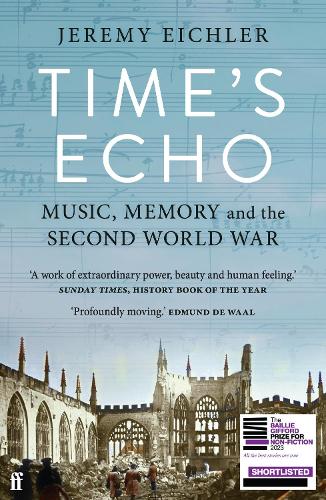
Time's Echo: Music, Memory, and the Second World War
(Paperback, Main)
Available Formats
Publishing Details
Time's Echo: Music, Memory, and the Second World War
By (Author) Jeremy Eichler
Faber & Faber
Faber & Faber
7th January 2025
12th September 2024
Main
United Kingdom
Classifications
General
Non Fiction
Autobiography: historical, political and military
Music
780.904
Physical Properties
Paperback
400
Width 129mm, Height 198mm
Description
'A work of extraordinary power, beauty and human feeling.' Sunday Times, History Book of the Year
'Profoundly moving.' Edmund de Waal
'A most rare book: extraordinarily powerful - magisterial, meticulously rich and unexpected, deeply affecting and human.' Philippe Sands
In Time's Echo, the award-winning critic and historian Jeremy Eichler makes a revelatory case for the power of music as culture's memory, an art form uniquely capable of carrying forward meaning from the past. While showing how four towering composers - Shostakovich, Britten, Schoenberg, and Strauss - transformed their experiences of the Second World War and the Holocaust into deeply moving works of music, Eichler proposes new ways of listening to history and coming to hear between its notes the resonances of what earlier eras have written, heard, dreamed, hoped, and mourned. A lyrical narrative full of insight, compassion and riveting storytelling, this book deepens how we think about the legacies of war, the presence of the past, and the promise of art for our lives today.
'The outstanding music book of this and several years.' Times Literary Supplement
'A masterpiece . . . We were stunned by its profundity, its masterful structure, its beautiful shimmering sentences.' Jury of the Baillie Gifford Prize
'Eloquent and thought-provoking . . . an insightful reflection on how we remember and who we forget.' Leah Broad, Financial Times
'A work of vast historical scholarship and acute musical insights.' John Adams, The New Yorker
'If you ever doubted that music matters, Eichler has written the book to prove you wrong.' Dominic Sandbrook, Sunday Times
Author Bio
An award-winning critic and cultural historian, Jeremy Eichler has written for the New York Times, the New Yorker and the Boston Globe, where he serves as chief classical music critic. His work has been recognised with grant awards from Harvard University's Radcliffe Institute and the National Endowment for the Humanities.
